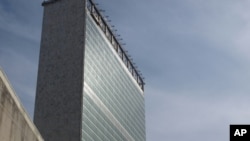President Barack Obama will address the United Nations General Assembly on Wednesday with a speech that is likely to focus on the dramatic transformations underway in the Middle East and North Africa, the troubled Israel-Palestinian peace efforts and the global economy.
Major themes for Obama are expected to include the so-called Arab Spring, dividends from international cooperation in Libya, efforts to bring Israel and Palestinians back to direct negotiations and ongoing global efforts against nuclear proliferation.
White House officials and a written policy overview issued on the eve of President Obama's speech shed light on what the president will discuss.
The White House document speaks of the Obama administration's "dramatically changed" course to advance U.S. "interests and values" and help forge a more secure and prosperous world in a "new era of engagement."
Results include "an unprecedented mandate to intervene and save lives in Libya," vigorous defense of Israel, support for the establishment of an independent South Sudan along with the strongest U.N. sanctions ever imposed on Iran and North Korea, and renewed momentum to stop nuclear proliferation.
President Obama is expected to point to Libya as the clearest example of what international cooperation can achieve. The president spoke on Tuesday as he met with leaders of Libya's National Transitional Council.
"Libya is a lesson in what the international community can achieve when we stand together as one," said President Obama.
Obama's U.N. speech will take place as the United States and its key diplomatic partners are involved in intense diplomacy to stem a Palestinian effort to secure statehood recognition by the U.N. Security Council.
The United States says it will veto any such resolution. And President Obama is expected to restate America's position before the U.N. General Assembly, saying that the only path to a two-state solution with security for Israel and a viable Palestinian state is through the resumption of direct peace talks.
White House Deputy National Security Adviser Ben Rhodes said Obama will underscore firm U.S. support for Israel, but repeat that peace is up to Israelis and Palestinians to create.
"At the end of the day, peace is going to have to be made between the parties - that it can't be imposed from the outside, that it can't be accomplished through actions at the U.N., that it is going to have to be Israelis and Palestinians sitting down and dealing with the very hard issues that have divided them for some time now," said Rhodes.
The White House on Tuesday recalled a pledge President Obama made to "continue U.S. efforts to combat all international attempts to challenge the legitimacy of Israel - especially at the United Nations."
Rhodes said the president will reflect on progress the United States has made in "reorienting" its foreign policy. This includes transitions underway in Afghanistan and Iraq, and progress in degrading the al-Qaida terrorist network.
The White House preview of the president's speech stressed the critical role of the United Nations as the United States draws down its forces in both countries in Iraq and Afghanistan.
President Obama's address will come a day before Iranian President Mahmoud Ahmadinejad speaks to the General Assembly. Officials say Obama will make a point of noting that Iranians were protesting for greater freedom long before the start of the Arab Spring.
Other topics Obama will likely cover in this, his third speech to the General Assembly include famine in the Horn of Africa and the role of U.S. assistance there along with the importance of international peacekeeping and global economic challenges.
The president might also mention the U.N. Human Rights Council. The White House overview of U.S. interests called the council flawed and noted that the United States helped prevent Iran and Syria from gaining seats on the council, and that it is working to end the "excessive focus" the body has had on Israel.
Obama UN Address to Spotlight Libya, Arab Spring, Mideast Peace Efforts
- By Dan Robinson
















